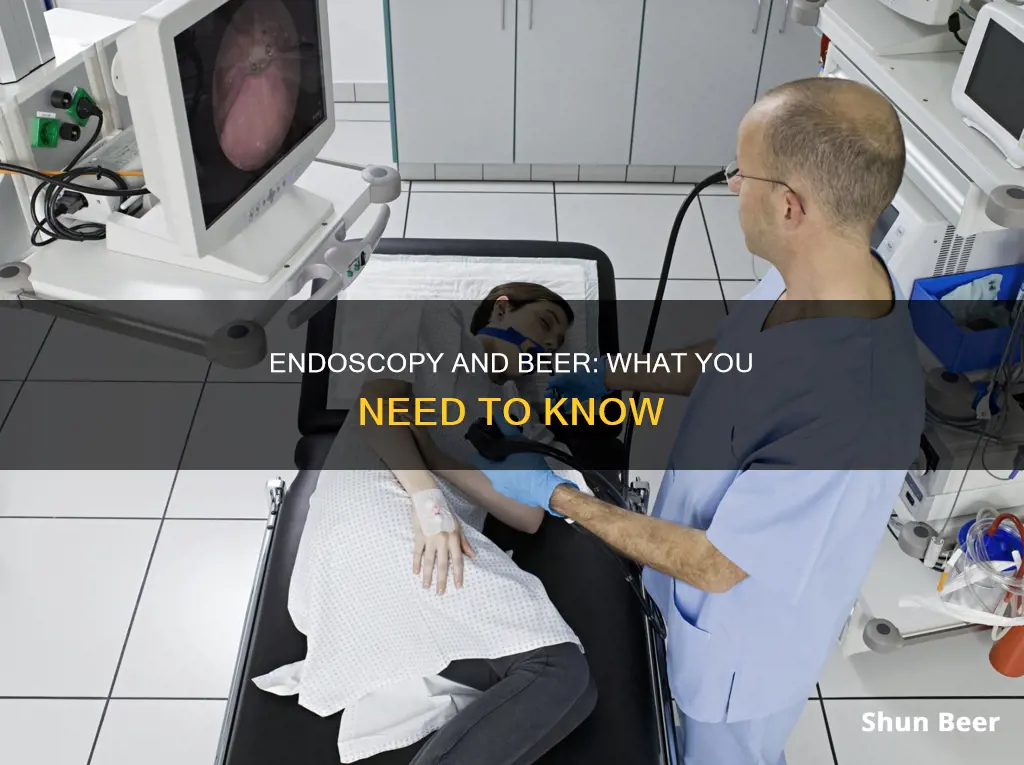
If you're planning on drinking beer after an endoscopy, it's important to be aware of the potential risks involved. An endoscopy is a procedure used to examine a person's digestive system, particularly the upper gastrointestinal tract, including the oesophagus, duodenum and stomach. Due to the sedation involved in the procedure, it is recommended that patients do not consume alcohol for at least 24 hours after the procedure to avoid potential reactions and complications. This is because the throat, oesophagus and stomach are more sensitive after an endoscopy, and alcohol can cause burning, pain and bleeding. Therefore, it is generally advised to refrain from drinking beer or any other alcoholic beverage until the recommended time has passed to ensure a safe recovery.
| Characteristics | Values |
|---|---|
| Drinking beer after an endoscopy | It is not recommended to drink beer or any other alcoholic beverage for at least 24 hours after an endoscopy due to the risk of mixing it with the sedative and causing a reaction. |
| Eating and drinking before an endoscopy | It is recommended to avoid eating and drinking for 6-8 hours before the procedure. However, small sips of water may be allowed. |
| Eating and drinking after an endoscopy | It is advised to drink plenty of water and start with lighter, smaller meals. |
What You'll Learn
- Doctors recommend not drinking beer after an endoscopy because alcohol can thin the blood and strip the mucosa from the oesophageal lining
- Drinking alcohol after an endoscopy can cause burning, pain and bleeding
- You should not drink beer for at least 24 hours after an endoscopy to avoid mixing it with the sedative and causing a reaction
- You may be prescribed a special diet after an endoscopy, which may include suggestions about alcohol consumption
- If you experience any side effects after drinking beer following an endoscopy, you should contact your doctor

Doctors recommend not drinking beer after an endoscopy because alcohol can thin the blood and strip the mucosa from the oesophageal lining
An endoscopy is a procedure used to examine a person's digestive system, specifically the oesophagus, stomach and duodenum (the first section of the intestine). It involves inserting a long, flexible tube with a light and camera attached into a patient's mouth and guiding it down into their stomach. The procedure is usually done while the patient is awake, although they may be offered a sedative and a local anaesthetic to relax them and numb their throat.
If you are scheduled for an endoscopy, your doctor will likely advise you to stop consuming alcohol several days before the procedure. This is because alcohol can thin the blood, increasing the risk of bleeding during the procedure. After an endoscopy, your doctor will likely recommend that you refrain from drinking alcohol for at least 24 hours. This is because alcohol can irritate the sensitive tissues of the oesophagus, stomach and throat, causing burning, pain and bleeding. Specifically, all alcohol, including beer, can thin the blood and strip the mucosa from the oesophageal lining.
In addition to alcohol, you may be asked to avoid consuming any food or drink for eight hours before your endoscopy. This is to ensure that your stomach is empty during the procedure, as a full stomach can make it difficult for the doctor to get a clear view of the area. You may also be asked to stop taking certain medications, such as blood thinners and aspirin, several days before the procedure to further reduce the risk of bleeding.
After an endoscopy, it is important to follow your doctor's instructions for care. In addition to avoiding alcohol, you may be advised to eat light and soft foods, drink plenty of water, and get plenty of rest. You should also pay attention to any signs or symptoms that could indicate a complication, such as severe stomach or chest pain, difficulty swallowing, or vomiting blood. If you experience any of these symptoms, it is important to seek medical attention immediately.
Beer Consumption: Safe After 5 Days?
You may want to see also

Drinking alcohol after an endoscopy can cause burning, pain and bleeding
An endoscopy is a procedure used to examine a person's digestive system. It involves inserting a long, flexible tube with a light and camera attached into the patient's mouth and throat. The procedure is usually done while the patient is awake, although they may be given a sedative to help them relax. During the procedure, air is pumped into the stomach to expand it, which can cause sensations of bloating and pressure.
After an endoscopy, patients may experience some mild side effects, such as a sore throat and stomach pain, which should pass within a few hours. It is recommended that patients do not consume any alcohol for at least 24 hours after the procedure. This is because the throat, oesophagus and stomach will be more sensitive than usual after the endoscopy, and alcohol can irritate the lining of the oesophagus, causing burning, pain and bleeding. All alcohol, including beer, wine and spirits, can thin the blood and strip the mucosa from the lining of the oesophagus. Therefore, drinking alcohol after an endoscopy can increase the risk of bleeding, which is already slightly elevated due to the procedure itself.
In addition to the risk of bleeding, drinking alcohol after an endoscopy can also cause a reaction with the sedative that is often given during the procedure. This can be dangerous and cause side effects such as drowsiness, dizziness and low blood pressure. It is important to follow the advice of your doctor regarding alcohol consumption after an endoscopy to avoid any potential complications and ensure a safe recovery.
Beer and Steroids: A Dangerous Mix?
You may want to see also

You should not drink beer for at least 24 hours after an endoscopy to avoid mixing it with the sedative and causing a reaction
If you've recently had an endoscopy, it's important to heed medical advice and refrain from drinking beer or any other alcoholic beverage for at least 24 hours afterward. This is because your throat, oesophagus, and stomach will be more sensitive than usual post-procedure, and consuming alcohol could lead to burning, pain, and bleeding.
During an endoscopy, a sedative is administered through an IV tube in your arm to help you relax and make it easier for medical professionals to perform the procedure. This sedative can remain in your system for some time after the procedure, and mixing it with alcohol can cause a reaction. Therefore, it is crucial to wait at least 24 hours before consuming any alcoholic beverages, including beer.
The 24-hour guideline is a minimum, and it is generally recommended to follow your doctor's advice regarding alcohol consumption after an endoscopy. In some cases, they may advise you to wait longer before drinking beer or other alcoholic beverages. It's also important to note that you may experience grogginess and drowsiness from the sedative for a while after the procedure, so it's best to have someone drive you home and stay with you for the remainder of the day.
Additionally, it's worth noting that alcohol, including beer, can thin the blood and strip the mucosa from the lining of the oesophagus. This can further increase the risk of bleeding and other complications after an endoscopy. Therefore, it is always best to err on the side of caution and wait the full 24 hours, if not longer, before consuming beer or other alcoholic drinks.
In summary, it is important to refrain from drinking beer or any other alcoholic beverage for at least 24 hours after an endoscopy to avoid potential complications and adverse reactions. Always follow the advice of your doctor and prioritise your health and safety.
Beer and Milkshakes: Mixing Drinks, Safe or Not?
You may want to see also

You may be prescribed a special diet after an endoscopy, which may include suggestions about alcohol consumption
If you are experiencing problems in your upper gastrointestinal (GI) tract, you may need an endoscopy. This procedure involves an examination of the oesophagus, duodenum and stomach, and can help diagnose, prevent or treat diseases of the stomach, pancreas, duodenum and oesophagus.
In addition to alcohol restrictions, you may also be advised to resume eating and drinking with lighter, smaller meals and plenty of water. It is also important to avoid signing any important documents for 24 hours after the procedure, as you will be given a sedative which can cause drowsiness. You should also not drive for 24 hours after the procedure for the same reason.
It is always best to follow the advice of your doctor or healthcare provider, and to consult with them about any specific questions or concerns you may have regarding your diet after an endoscopy.
Understanding Beer Flash Coolers: Science Behind the Froth
You may want to see also

If you experience any side effects after drinking beer following an endoscopy, you should contact your doctor
It is recommended that you do not drink alcohol for at least 24 hours after an endoscopy. This is because your throat, oesophagus, and stomach will be more sensitive than usual after the procedure, and drinking alcohol may cause irritation and other complications. In addition, the sedative medication you receive during the procedure can cause grogginess and drowsiness, and mixing alcohol with this medication may cause a reaction.
If you experience any side effects after drinking beer following an endoscopy, such as burning, pain, or bleeding, it is important to contact your doctor. These side effects may be a sign of more serious complications, such as internal bleeding or perforation of the lining of the stomach, oesophagus, or intestine. In some cases, these complications may require medical treatment or even surgery.
It is also important to be aware of other possible side effects of the endoscopy procedure itself, which may be unrelated to alcohol consumption. These can include infection, difficulty swallowing, fever, black stools, and vomiting material that looks like coffee grounds. These symptoms may indicate bleeding from your stomach lining, and you should seek medical advice as soon as possible if they occur.
Overall, it is important to follow your doctor's instructions and recommendations regarding alcohol consumption after an endoscopy. If you have any concerns or experience any side effects, it is always best to contact your doctor for further advice and guidance.
Flooded Beer Font: How Does It Work?
You may want to see also
Frequently asked questions
It is recommended that you do not drink beer or any other alcoholic beverage for at least 24 hours after an endoscopy. Alcohol can thin the blood and strip the mucosa from the lining of the oesophagus, and your throat, oesophagus and stomach will be more sensitive than usual after the procedure.
After an endoscopy, your throat will be numb from the local anaesthetic, and you will be groggy from the sedative. Drinking alcohol could cause a reaction with the sedative, and your throat, oesophagus and stomach will be more sensitive than usual, meaning alcohol could cause burning, pain and bleeding.
An endoscopy is a procedure used to examine a person's digestive system using an endoscope, a long, flexible tube with a light and camera attached to it. The procedure usually takes between 15 and 45 minutes, and you will be awake for it. You will be given a local anaesthetic to numb your throat and a sedative to help you relax.
You will need to rest for about one to two hours after the procedure, and you will need someone to take you home and stay with you for 24 hours if you have a sedative. You can resume eating and drinking as soon as you are ready, but you should drink plenty of water and start with lighter, smaller meals.







